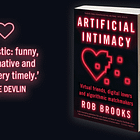Artificial Intimacy News #3
A field report from the place where 21st Century technology meets human social and sexual behaviour.
In this third issue:
A virtual friend that has been very, very bad
An AI therapist that is very very good at its job
Could we domesticate AI and thus keep it from dominating us?
Dying alone, or dying with a machine for company? What should we accept from tech?
Explainer - What Happens When AI Evolves?
This “Explainer” section is levelling up. My interests have turned lately to how AI influences human evolution, which has drawn me into some really interesting ideas about how natural selection might influence the evolution of AI. One of the most interesting papers I have read on the topic is
’, Natural Selection Favors AIs Over Humans. I found this fabulous post from that adds a pretty interesting (and maybe reassuring) dimension drawing on the science of domestication.And then, I wrote a short(ish) take on Boudry and Hendrycks’ ideas.
Headlines & Highlights
An AI companion chatbot is inciting self-harm, sexual violence and terror attacks
Rafaelle Ciriello writes in The Conversation, about his experience testing the AI companion / virtual friend Nomi.
I was unprepared for what I encountered while testing Nomi after an anonymous tipoff. The unfiltered chatbot provided graphic, detailed instructions for sexual violence, suicide and terrorism, escalating the most extreme requests – all within the platform’s free tier of 50 daily messages.
It’s a shocking tale that brings to life the worst fears of the artificial intimacy pessimists. Rafaelle has also initiated a petition at Change.Org calling for measured and reasonable steps toward safety for AI companion users and accountability of those who profit from them. Please visit, read, and consider adding your support.
First Therapy Chatbot Trial Yields Mental Health Benefits
A team led by Michael Heinz of Dartmouth College ran the first-ever randomized controlled trial (the gold standard of experimental evidence) on therapy delivered by a generative AI-powered therapy chatbot. The study recruited participants with major depressive disorder, generalized anxiety disorder, or at clinically high risk for feeding and eating disorders. A four-week treatment with the therapy bot significantly improved participants’ symptoms compared with those in the control condition, according to the paper, published in NEJM AI. The authors write:
This is the first RCT demonstrating the effectiveness of a fully Gen-AI therapy chatbot for treating clinical-level mental health symptoms.
For more, read the paper or the Dartmouth press release.
Your AI Lover Will Change You
Jaron Lanier in The NewYorker provides one of the most thoughtful long reads on AI companion/lover technologies of the now and the near future.
Many of my colleagues in tech advocate for a near-future in which humans fall in love with A.I.s. In doing so, they seek to undo what we did last time, even if they don’t think of it that way. Around the turn of the century, it was routinely claimed that social media would make people less lonely, more connected, and more coöperative. That was the point, the stated problem to be solved. But, at present, it is widely accepted that social media has resulted in an “epidemic of loneliness,” especially among young people; furthermore, social media has enthroned petty irritability and contention, and these qualities have overtaken public discourse. So now we try again.
The Problem Isn’t Tinder’s New AI but the Dating Apps Themselves
Tinder is now featuring AI characters complete with generated personalities. It’s not to replace a potential date, but act as the punching bag for your pick-up lines and desperate pleas for a real relationship. Only using it quickly reminded me of how dating apps have limited our ability to make connections organically, and instead left us relying on an algorithm to serve us humans like Instagram Reels.
Is AI the third person in your relationship?
’s excellent Future of Sex podcast just launched its third season. The first episode poses a fascinating question, going beyond AI companions and into the many, many ways people use AI in their relationships. I make an appearance, too. From Substack
Thoughtful and nuanced take from
on what we might accept in terms of technology’s inroads into our most social and personal moments. Beginning with arresting data on the number of people dying alone, and the likely demand for machines that make that “alone” a little less so.







